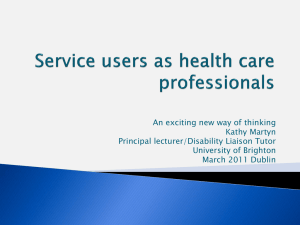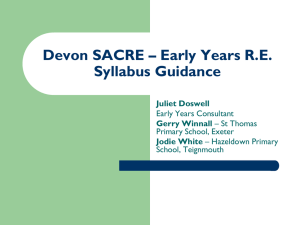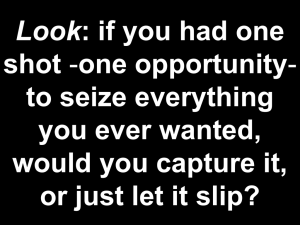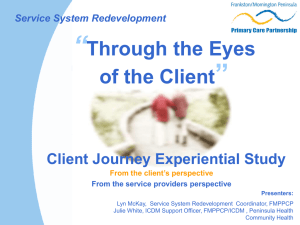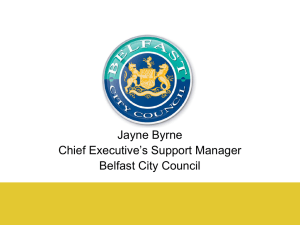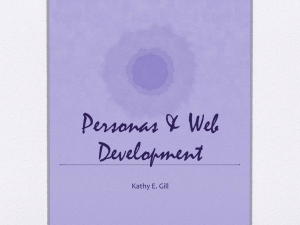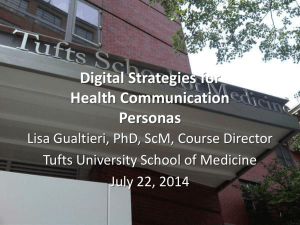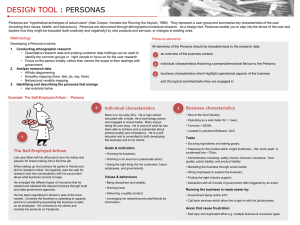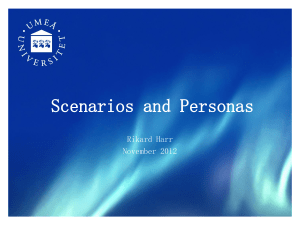Learning Journey
advertisement
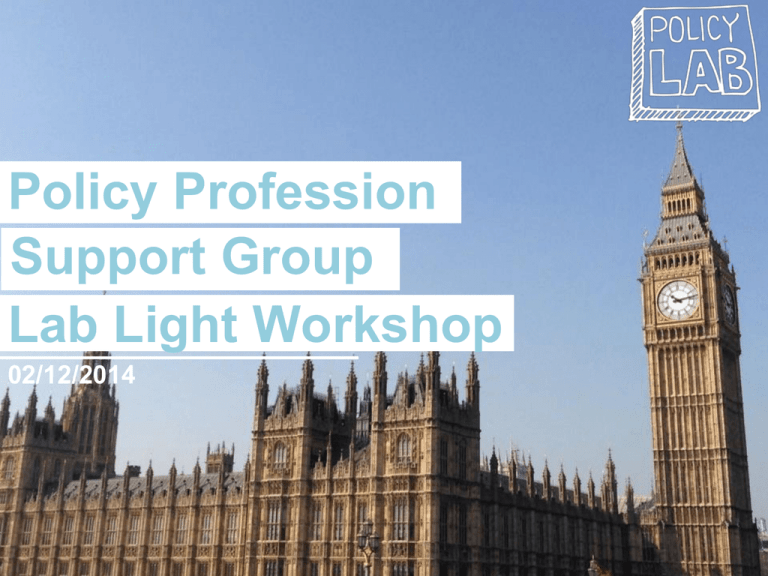
Policy Profession Support Group Lab Light Workshop 02/12/2014 Structure 1 2 3 4 5 Intro to Policy Lab and our approach. Theoretical background of learning & skills acquisition. Creating personas for Policy Profession Learners. Learning Journeys. Refining principles of learning & assessment. Introduction to Lab & our approach Intro to Lab & our approach What is Policy Lab? We are a creative space where policy makers can develop skills and knowledge to make policy in a more open, digital and user-centred way. No physical office, “pop up” concept. Systems design concepts and techniques. Intro to Lab & our approach What do we do? Test out open policy-making tools and techniques. Evaluate and refine new tools and methods through practical projects and experiments. Work on ‘real life’ policies. Aim to make better policies that succeed, make a difference to people and don’t waste taxpayers money. Intro to Lab & our approach Collaborative approach Help Government and public services view their work from the outside. Involves many different people and uses different perspectives: service users, academics and experts, the public and ‘frontline’ professionals. Ensure policy works for people it affects. Intro to Lab & our approach How do we work? Demonstration projects Specialist support for policy makers interested in applying new thinking, approaches and techniques. Real policy challenges. Intro to Lab & our approach How do we work? Lab Light Is an opportunity for policy makers to quickly try out experimental techniques, from data science to co-design, building confidence, skills and new knowledge. Intro to Lab & our approach What we’ve done so far Demonstrator Projects: • Police Digitisation: to improve crime reporting and developed digital tools being tested by 2 forces. • Family Mediation: encouraging people to use mediation rather than litigation after separation or divorce. • National Insurance Numbers Project: encouraging young people to understand their NI numbers and value them. Developed a toolkit that has been shared with over 500 civil servants through ‘Lab Light’ events. Organised the “Northern Futures Ideas Day” across 8 cities in the north simultaneously where around 200 people came together to create solutions for creating a “Great North 2030’, the best of which were showcased to the DPM. The The Session Session On the 2nd December 2014 Policy Lab held a two hour ‘Lab Light’ workshop for 17 people from the Policy Profession Support Unit (PPSU). The aim was to help PPSU produce ‘learning journeys’ for people in the policy profession and consider where assessments could be integrated. The group created four personas of typical policy profession learners considering their backgrounds, qualifications, existing skills and learning goals. A ‘learning journey’ was plotted for each persona, thinking about how they learn and the challenges they might face. The groups also considered where assessment might be placed in the learning journey and the forms it should take. Tools & Techniques Tools & Techniques Stages of design process Stages of the design process Discover scope Mandate Inputs Develop proposals Scope Options Brief Tools & Techniques Ideas from the PPSU Workshop Theoretical Background Kolb (1984) experiential learning theory/learning styles. Dreyfus (2004) model of skill development. Hopes & Fears Hopes • Creative, responsive & relevant. • Make good use of digital media. • Assessment is organic & natural. • Being open & expansive to see the big picture. • No borders or limits to utilise internal and external expertise. • Standardised high level of skill & ability. • A clear knowledge & skills base. • Clear path of progression & attainment. Fears • Too regimented. • Too unstructured & hard to negotiate. • Bureaucratic monstrosity. • Narrow & and insular. • Closed off and closeted. • ‘Flash in the pan’ then fades away. • Mired in management speak. • Unwilling to learn from mistakes. • Lots of process & admin but little tangible gain. • Style over substance & papering over the cracks. Personas Name Draw the learner Age Current role, grade & department Policy challenges I’m working on Previous roles & departments & education Technology usage habits Less confident More confident Social media E-learning Home usage My policy skills and knowledge Novice Advanced beginner 1 Current level 2 Current level Competent Proficient Expert I’m motivated to learn because… Desired level Desired level 3 Current level Desired level Current level 4 I learn best through…. (circle the top two) Desired level Concrete experience Active experimentation Reflective observation Abstract conceptualisation Personas Alex 1 • 41-year-old woman. • Grade SCS1 but new to grade. • Works in the Cabinet office, previously at the MOJ. • Entered civil service as Faststreamer. • Previous secondment to local government. • Lawyer by training but chose not to practice. • Currently working on Scottish devolution. • Moderate user of social media, minimal user of e-learning and moderate to high home digital user. Personas Alex 2 • 37-year-old man. • Grade 7, works at DECC on wind farms. • Engineering degree. • Previously worked in the private sector for Ford. • He is tech-savvy and always carries his iPhone, Macbook and headphones. • He is motivated to learn so he can apply his knowledge to make a difference. • Heavy digital user, particularly social media & gaming. Personas Bob • 38-years-old. • Grade 6, head of Cyber Crime Policy (Home Office/FCO). • Studied medieval history. • Faststreamer. • Strong public service ethic & interest the job. • Motivated by getting a salary, has a mortgage & two children to support (aged 3 & 5). • Likes having flexible working hours. • Previously introduced a biometric passport system at BA. • Bob is a heavy digital user for shopping and a moderate user for e-learning and social media. Personas Dwain • 25-year-old man. • New to civil service, trained as a teacher and taught for 2 years. • Second year Faststreamer. • Works on Universal Credit on the ‘front end’ digital claims process. • Enthusiastic and career focused. • Work priorities include analysis, digital, political awareness, social impact and implementation; proficient only in digital. • Dwain is a heavy user of digital media at home, particularly social media and gaming. Learning Journey Find out about it What touchpoints or channels does your learner interact with? What does s/he do, know, say, feel… Web Face to face Email Printed material Preparation/o n-boarding 1 Map out the phases of the journey and interactions with other people and formal and informal learning “touchpoints”. 2 What are the three important “moments of truth”? 3 Where does assessment fit into your journey? Structured learning Right after Putting it to use: impact on policy making Learning Journey Alex 1 “Moments of Truth” • Developing links with academic experts increases understanding of policy content & background. • Supportive SCS2+ mentor giving useful & constructive feedback. • Positive 360 degree feedback increases confidence . “Hot Spots” • Difficulty establishing a Scottish network (closed community? resistant to outsiders from Westminster?). • Difficulty getting academics and experts on board. • Time pressures. Learning Journey Alex 2 “Moments of Truth” • Positive feedback on initial wind farm study. • Well received submission as part of a policy project. • Supportive & encouraging SCS mentor. “Hot Spots” • Poorly received submission as part of policy project. • Poorly supportive line manager who doesn’t understand engineering background. • Negative response when advising ministers. Learning Journey Bob “Moments of Truth” • Inspired by research into ‘best in class’ practice. • Being able to lead and drive the agenda and propose expenditure. • Reflection on own performance and recognition of progress. “Hot Spots” • Lack of motivation to get started and do preparation, needs to be a self-starter. • Time constraints or the need to be away from home and family. • Having to write up a long report after the learning experience. Learning Journey Dwain “Moments of Truth” • Self-assessment of strengths and weaknesses, identifies own potential. • Identifies the opportunity to try out skills and gets feedback. • Positive experience of shadowing senior colleagues & ministers. Hot Spots” • Negative experience of shadowing senior colleagues & ministers . • Resistance from line manager about learning, training & development. • Poor feedback and assessment results. What we learned… • Needs for the process not to be bureaucratic. • Any training & qualifications should stand the test of time & not be a ‘flash in the pan”. • Continuous assessment to assess progress. • Different types of assessment needed appropriate to the skill being assessed. • Any training or assessment should be user-centred. • Policy professionals are enthusiastic about new ways of working like co-design. • Any training or qualification should have currency inside and outside of government & the civil service. • Recognition of experiential and ‘on the job’ learning. • Need to further define knowledge and skills base & develop a set of principles & standards. • Needs to be attractive to candidates inside and outside the civil service. PPSU Workshop Thank you, please keep in touch. Please feel free to leave feedback via email or twitter: andrea.siodmok@cabinetoffice.gsi.gov.uk @policyLabUK “Tell me and I forget. Teach me and I remember. Involve me and I learn.” Benjamin Franklin

